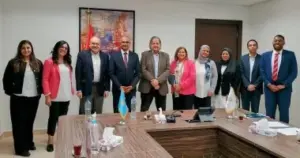Dr. Sayed Ismail, Deputy Minister of Housing, received representatives of the World Bank delegation to follow up on the second phase of the Sustainable Rural Sanitation Services Program. The program is co-financed by the World Bank and the Asian Infrastructure Investment Bank with a total investment of $600 million. Its primary goal is to enhance sanitation services and infrastructure in the governorates of Menoufia, Damietta, Gharbia, Sharqia, Dakahlia, and Beheira, as well as to improve the performance of drinking water and sanitation companies. Dr. Ismail praised the accomplishments and execution progress of the program, emphasizing the importance of collaboration among all concerned stakeholders.
The World Bank delegation visited the Talla Wastewater Treatment Plant expansion project in Menoufia and the Nasriya Wastewater Treatment Plant in Damietta to monitor ongoing projects within the program.

The visit was attended by representatives from the Project Management Unit and the relevant utility companies. A session was also held focusing on environmental and community activities. Engineer Heba Yakan, head of the delegation, praised the progress of both implementation and financial aspects of the projects and commended the achieved completion rates.
Gustavo, a sanitation expert at the World Bank, commended the performance of the employees working within the executing companies, highlighting their efficiency in investment management which supports the sustainability of sanitation services. He also lauded the recent advancements in Egypt’s water and sanitation sector, including the issuance of the National Strategy and the Water Law.
For his part, Dr. Sayed Ismail noted that sludge management is one of the ministry’s top priorities, indicating that the proper utilization of produced sludge will positively impact public health, contribute to a cleaner environment, increase company revenues, and reduce energy costs.
